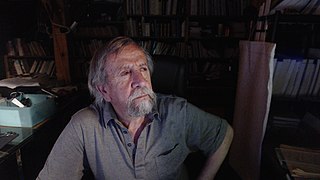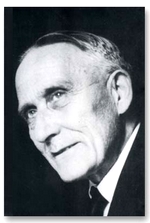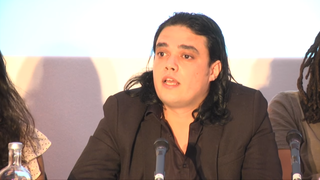
Joseph Fadelle (born Mohammed al-Sayyid al-Moussawi - Arabic: محمد السيد الموسوي), is a Roman Catholic convert from Islam and a writer born in 1964 in Iraq in a Muslim Shiite family. [1]

Joseph Fadelle (born Mohammed al-Sayyid al-Moussawi - Arabic: محمد السيد الموسوي), is a Roman Catholic convert from Islam and a writer born in 1964 in Iraq in a Muslim Shiite family. [1]
Born in Iraq, in a relatively wealthy older aristocratic Shiite family of this country, Fadelle fled the country with his wife and children because of the fatwa after his conversion to Christianity. His conversion took place after a conversation with a Christian during his military service in 1987, [2] and a dream and a strict reading of the Koran and the Bible. Joseph Fadelle went through a phase of atheism. He also had a dream that led him to embrace the Christian faith. He lived his conversion secret for many months, then he told his wife and she decided to follow her husband’s religion. He was discovered by his brothers who searched his bedroom and found a Bible, his brothers asked his son about what they did on Sundays and the little boy made the sign of the Cross. His family wanted to kill him. Tortured by the political regime of Saddam Hussein for several months at the request of a cousin, Fadelle was released only after his cousin died. He had to wait long to be baptized, as the Catholic authorities sought to avoid violating an Iraqi law banning proselytizing. Fadelle fled Iraq through Jordan, narrowly escaping an assassination attempt organised by his own brothers and uncle, and where a Muslim official of UNHCR (UN High Commissioner for Refugees) falsely accused Fadelle before Western authorities of complicity in the gas attack on Kurds which left 5,000 dead. Fadelle has lived in France since 2001 and has since obtained French citizenship.
In his autobiography, The Price to Pay, he describes his conversion, and refers to Muhammad as a political strategist, and not a religious man, and that Islam as a prison from which his conversion liberated him.
When traveling in public, Fadelle is escorted by police because of death threats.
In 2014, Fadelle prefaced Interroger l'Islam : 1235 questions à poser aux Musulmans !, authored by Guy Pagès. [3]

Tariq Ramadan is a Swiss Muslim academic, philosopher, and writer. He was a professor of contemporary Islamic studies at St Antony's College, Oxford and the Faculty of Theology and Religion, University of Oxford, but since 2018 has been taking an agreed leave of absence due to being held in prison following two rape allegations. He is a senior research fellow at Doshisha University in Japan, and is also a visiting professor at the Université Mundiapolis in Morocco. He was a visiting professor at the Faculty of Islamic Studies at Hamad Bin Khalifa University in Qatar, and used to be the director of the Research Centre of Islamic Legislation and Ethics (CILE), based in Doha. He is a member of the UK Foreign Office Advisory Group on Freedom of Religion or Belief. He was listed by Time magazine in 2000 as one of the seven religious innovators of the 21st century and in 2004 as one of the 100 most influential people in the world and was voted by Foreign Policy readers as one of the top 100 most influential thinkers in the world and Global Thinkers. Ramadan describes himself as a "Salafi reformist".

Claude Cahen was a 20th-century French Marxist orientalist and historian. He specialized in the studies of the Islamic Middle Ages, Muslim sources about the Crusades, and social history of the medieval Islamic society.

Sami Awad Aldeeb Abu-Sahlieh is a Swiss Palestinian lawyer.

Louis Massignon was a French Catholic scholar of Islam and a pioneer of Catholic-Muslim mutual understanding. He was an influential figure in the twentieth century with regard to the Catholic church's relationship with Islam. He focused increasingly on the work of Mahatma Gandhi, whom he considered a saint. He also played a role in Islam being accepted as an Abrahamic Faith among Catholics. Some scholars maintain that his research, esteem for Islam and Muslims, and cultivation of key students in Islamic studies largely prepared the way for the positive vision of Islam articulated in the Lumen gentium and the Nostra aetate at the Second Vatican Council. Although a Catholic himself, he tried to understand Islam from within and thus had a great influence on the way Islam was seen in the West; among other things, he paved the way for a greater openness to dialogue inside the Catholic Church towards Islam as it was documented in the pastoral Vatican II declaration Nostra aetate.

Youakim Moubarac was a Lebanese French scholar. He was an Islamologist, an Arabist and a disciple of the Orientalist Louis Massignon and of philosopher Louis Gardet. A Maronite priest, Moubarac dedicated his life and major works to interfaith dialogue between Christianity and Islam, to Arab and Lebanese causes, to the unity of the Church and to the Maronite Church Antiochian heritage.

Antoine Sfeir was a Franco-Lebanese journalist.

Abdelwahab Meddeb was a French-language writer and cultural critic, and a professor of comparative literature at the University of Paris X-Nanterre.
The Safavids carried a process of forced conversion from Sunni Islam to Shia Islam that took place roughly over the 16th through 18th centuries and turned Iran, which previously had a Sunni majority population, into the spiritual bastion of Shia Islam. It was a process that resulted in hostility with Iran's Sunni neighbours, most notably the Ottoman Empire. The conversion also ensured the dominance of the Twelver sect within Shiism over the sects of Zaydism and Isma'ilism – each of whom had previously experienced their own eras of dominance within Shi'ism. Through their actions, the Safavids reunified Iran as an independent state in 1501 and established Twelver Shi'ism as the official religion of their empire, marking one of the most important turning points in the history of Islam.

Waleed Al-Husseini or Walid Husayin is a Palestinian atheist, secularist essayist, writer, blogger, ex-Muslim and founder of the Council of Ex-Muslims of France. Born and raised in Qalqilya in the West Bank, he has been living in France since 2012.
Louis Gardet was a French Roman Catholic priest and historian. As an author he was an expert in Islamic culture and sociology who had a sympathetic view of Islam as a religion. He considered himself "a Christian philosopher of cultures". Islam's men, Mentality of Approaches is one of his best and most widely read works.

The Price to Pay is a 2012 autobiography by Joseph Fadelle, an Iraqi man who converted from Islam to Roman Catholicism. It was first published on October 3, 2012 through Ignatius Press.

Ludovic-Mohamed Zahed is a French-Algerian imam. An openly gay Muslim, Zahed is the founder of an Islamic prayer room in Paris, France, with the goal of accommodating the LGBT and feminist Muslim communities. He also founded the LGBT Muslim association HM2F, and manages the Calem Institute in Marseille.

Malek Chebel was a notable Algerian philosopher and anthropologist of religions. He was one of the most prominent North African intellectuals. He studied in Algeria, then later in France at Paris where he also studied psychoanalysis. He was a teacher at many universities worldwide.

Father Guy Pagès is a French Roman Catholic abbot and author. He is known for his writings about Islam.
Lycée-Collège Averroès is a private Muslim junior and senior high school/high school and sixth-form college in Lille, France. It contracted with the state and receives government subsidies, doing so since 2008; As of 2013 it is the only Islamic secondary school in France to do so. The Lycée is located in Lille-Sud adjacent to a mosque.
Georges-Henri Bousquet was a 20th-century French jurist, economist and Islamologist. He was a professor of law at the Faculty of Law of the University of Algiers where he was a specialist in the sociology of North Africa. He is also known for his translation work of the great Muslim authors, Al-Ghazali, a theologian who died in 1111 and Tunisian historian Ibn Khaldun (1332–1406). He was known as a polyglot, spoke several European languages and Eastern ones.
Geneviève Gobillot is a French scholar of Islam, Muslim civilization professor at the Jean Moulin University Lyon 3 since 1993, a specialist in Islamic mysticism, Shi'ism and Sufism, particularly in Al-Hakim al-Tirmidhi, author of the 10th century. Her work also includes the intercultural and intertextual reading of the Qur'an in the context of a rapprochement between monotheisms.
Jocelyne Dakhlia is a French historian and anthropologist. A director of studies at the École des hautes études en sciences sociales, her work is concerned principally with the political and cultural history of Islam in the Maghreb countries bordering the Mediterranean Sea.

The Blasphemer: The Price I Paid for Rejecting Islam is an autobiography by Waleed Al-Husseini, a Palestinian ex-Muslim atheist activist who was imprisoned for online blasphemy, after which he was released and fled to France. He originally wrote the book in Arabic. It was translated to French by Chawki Freiha and first published on 14 January 2015 by Éditions Grasset & Fasquelle, while the English translation was provided by Skyhorse Publishing in May 2017, and the Italian by Nessun Dogma in September 2018.